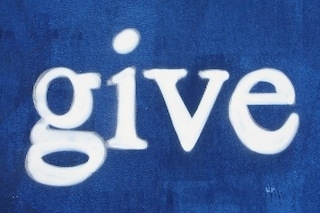There are certain times of the year, like right now, that helps us to think about the spirit of giving and sharing. The holiday season is definitely one of those times. Against the back drop of all of the difficult and painful stories unfolding in the news, shifting gears to talk about the charitable topic of giving back, is a very welcome respite. So, when I was asked to talk about the 27 acts of kindness campaign on national TV a few years ago, I couldn't say "Yes" fast enough. In fact, I leaped at the chance to talk about how important acts of generosity and kindness can heal the human spirit and soul.
Generosity may be the single most important way to achieve human happiness. When we give to others, whether it's material or physical, it creates a powerful emotional bond between people that can spread real feelings of bliss. This generosity of spirit is not only about the selfless giving of material objects we give to others, but more about the everyday positive and uplifting things we say to one another. Even a well meaning and warm smile can spread a spirit of kindness, which produces a positive contagion affect. Making others feel good not only is character building, but it also helps us to experience real joy. This type of giving has two effects, happiness for others and happiness for ourselves. Now that's a hard combination to beat!
We've established being charitable, whether it's done through sharing your time, money or efforts, feels good. But why? According to some of the recent research by Paul Zak, founder of Claremont Graduate University Center for Neuroeconomics, giving, although we say comes from the heart, actually comes from the brain. There's a part of the brain called the subgenual cortex which makes people feel good when they are doing something positive. The brain reacts to certain charitable or philanthropic behaviors by releasing the feel-good chemical called dopamine into our bodies. This release of dopamine creates a warm glow or something called a "helper's high" type of sensation.
The act of giving affects people's emotional well being, too. It increases our self-esteem to identify ourselves as a person who does the right thing. We prefer to think of ourselves as a kind and giving person. This not only helps us to feel more connected to others, but it also helps us to develop a sense of meaning and purpose, both in our relationships and the activities we pursue.
Feeding others, both literally and figuratively is a classic way of human bonding. It probably got its roots from the most basic of human interaction, that of the mother feeding a child. So as human beings we are biologically programmed and biochemically rewarded to give. This gives us an evolutionary advantage of strengthening our human bonds, which also helps us to survive as a group. Even the act of thinking about giving seems to have a positive physiological impact, according to Stony Brook University Medical Center's post. Elderly individuals who volunteer tend to live longer.
Kids whose parents taught them to be grateful and give back, are more resilient and live happier lives says, Christine Carter, executive director of the University of California's Greater Good Science Center. Giving has even been found to lower stress levels by helping us to be less self preoccupied.
Giving is contagious and can lead to a cascade of generosity and positive feelings. So use this holiday season to set your charitable approach to living and giving in motion. Not only will it make the recipient of your generosity feel good, it will also benefit you as a person emotionally, spiritually and physically.
